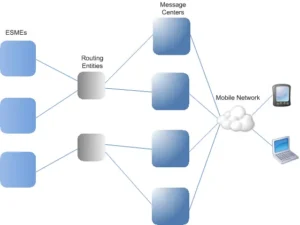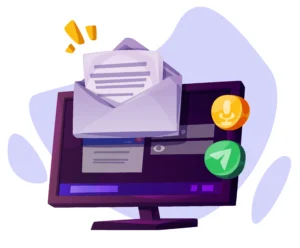This article aims to provide comprehensive insights into the concept of an SMS gateway, use cases, and the best practices for evaluating the most suitable SMS gateway for your business needs.
Through this exploration, you will gain a thorough understanding of the pivotal role played by SMS gateways in modern communication, enabling you to make informed decisions in selecting the ideal service provider that aligns seamlessly with your business objectives.
What is an SMS Gateway?
SMS Gateways or SMS platforms act as intermediaries that convert messages originating from web applications into a format compatible with mobile devices. They play a crucial role in facilitating message transmission through the network and ensuring successful delivery to the intended recipients.
SMS messages are typically transmitted from a software application, often operated on a computer system, and relayed to a mobile phone or any SMS-enabled device through the global telecommunication network.
During its inception of telecommunications, text messaging was mostly relied on hardware, incorporating embedded SIM cards and radio towers. However, with technological advancements, Cloud-based SMS Gateways now handle message translation and communication effortlessly.
How does an SMS Gateway Work?
SMSCs or Short Message Service Centers are responsible for sending and controlling SMS messages. SMSCs on both sides may have different protocols for handling SMS messages. Because of this, they are not able to exchange messages and this is where SMS Gateways comes into the picture. They allow the interworking of SMSC protocols and thus messages can be exchanged over the network.
Put simply, the Application sends a message request to the SMSC. The SMS Gateway then transforms the request into a compatible protocol that the operator can receive. Here’s a step-by-step breakdown of how a standard Text Messaging Gateway operates:
- The initial step involves composing the message by the sender using their mobile device or computer.
- The message is transmitted to the SMS gateway, where the commonly used protocol is SMPP (Short Message Peer-to-Peer).
- Upon reaching the SMS platform, the message undergoes processing, which entails various steps such as message formatting and recipient’s phone number verification.
- Following the processing, the SMS Gateway transmits the message to the appropriate mobile network (Mobile Operator SMSC), initiating the delivery process to the intended recipient.
- The message successfully reaches the recipient, who receives it on their mobile device, which may be a smartphone or any other basic mobile device.
Evolution of SMS Gateways
SMS Gateways used to be physical devices connected to mobile networks to send text messages. Now, modern gateways typically use SMPP to route messages to telco networks.
SMPP, (Short Message Peer-to-Peer) is a protocol for exchanging SMS messages between SMSCs (Short Message Service Centers) and/or ESMEs (External Short Messaging Entities).
Computers can interact with SMS Gateways in multiple ways:
- Through a REST API, where software developers send and receive SMS text messages over HTTP to the REST API, like Unecast Programmable SMS API
- SMPP API – You can also connect to SMS Gateways directly via the SMPP Protocol for faster and high performance use cases including sending transactional alerts or OTPs
How do I find the best SMS Gateway for my Business?
If you’re looking to establish efficient business communication via SMS, consider reaching out to a reputable SMS Platform Provider.
By taking these factors into careful consideration, you can discover the ideal SMS platform / service provider for your business. This choice will fulfill your communication needs, elevate customer engagement, and ultimately fuel business growth.
If you’re looking to establish efficient business communication via SMS, consider reaching out to a reputable SMS Platform Provider.
Navigating the plethora of options available in the market to find the optimal solution for your business can be challenging. Here are some essential factors to take into account:
- Coverage – Seek a gateway that offers extensive global coverage, encompassing a wide array of mobile networks and countries, empowering you to reach your customers worldwide without limitations.
- Features – Understand the features provided by the SMS Platform, including personalization, automated campaigns, analytics, and reporting, and select the ones that best align with your business objectives and communication requirements.
- Integration – Search for a gateway that offers seamless integration with your existing business systems, like CRM, marketing automation, or e-commerce platforms, through APIs or plugins. This integration will streamline your communication processes and enhance the overall customer experience.
- Pricing – Conduct a thorough comparison of the pricing plans offered by various providers and select the one that offers the best value for your money, taking into account your communication volume and frequency.
- Support -Evaluate the quality and accessibility of customer support provided by the gateway, encompassing technical assistance, training, and troubleshooting services.
- Security and Compliance – Verify that the platform adheres to strict data protection measures, obtains explicit consent from customers, and maintains accurate records to ensure compliance with relevant laws and regulations, such as GDPR and other local telecommunication regulations.
- Reputation – Seek out a service provider with a reputable track record and a strong presence in the market, backed by positive reviews from other businesses and industry experts.


